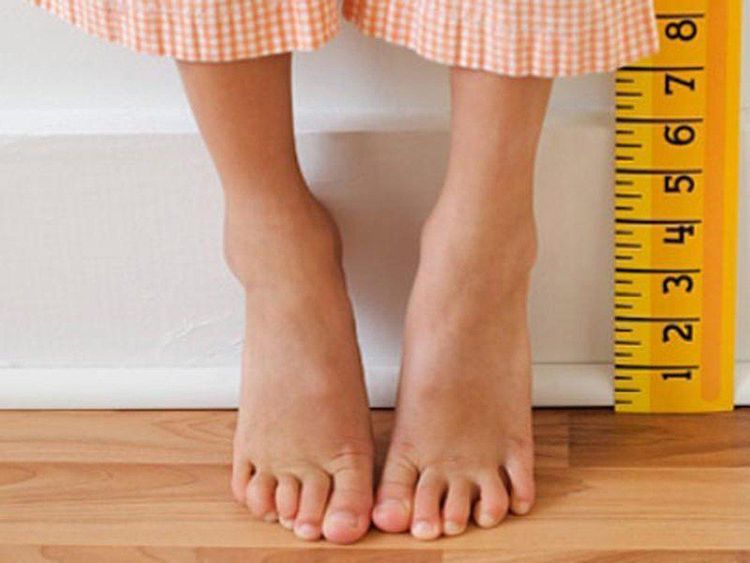Growing too quickly or being taller than average can be a concern for some. Does rapid growth compared to peers indicate a potential health issue? And is there a way to stop getting taller?
1. Can You Stop Your Height Growth?
Everyone is unique in their height, size, and shape. Genetics largely determines these factors. If you have taller-than-average parents, you're likely to be tall as well.
Researchers believe your genes can predict when you'll experience growth spurts. Sometimes, this can make individuals significantly taller than their peers. Generally, your height tends to change throughout life. Your bones grow from childhood through adolescence and continue into your early twenties. By middle age, the body tends to shrink. Many middle-aged adults may lose an inch or two from their peak adult height.
Concerns about being taller than average are often rooted in gender stereotypes, particularly the idea that women shouldn't be taller than men. This outdated notion has led some families to seek estrogen therapy for their daughters in hopes of stunting their growth. However, scientific evidence demonstrates that this therapy is ineffective at preventing height growth in girls and can cause unpleasant side effects.
Limb-shortening surgery exists but is rarely recommended for the sole purpose of stopping height growth. These procedures are typically reserved for individuals with leg length discrepancies.
Since your height is primarily determined by genetics, there are virtually no viable methods to intentionally stop your growth. It's best not to attempt to interfere with your natural height development unless you have a specific underlying health concern.
SEE MORE: What are common mistakes parents make when trying to boost their children's height too much?

2. What Factors Affect Your Height?
Here are the primary factors significantly influencing your height:
2.1. Genes
This is the most crucial element governing your height. Genetic influences on height can vary depending on region or ethnicity. For example, if your parents are significantly taller or shorter than average, your final height may mirror theirs. In other populations, if there's a height difference between parents (one short and one tall), your final height might fall somewhere in between. Additionally, some individuals experience atypical height, meaning they might be much taller or shorter than other family members.

2.2. Nutrition and Health During ChildhoodYour overall nutrition and health during childhood significantly impact your adult height.
Recent research indicates increased height in developed countries due to improved access to healthy food and better healthcare. Conversely, poor nutrition, lack of essential nutrients, inadequate healthcare, and even premature birth can contribute to shorter-than-average stature.
Scientists suggest most children with short stature and rickets lack essential nutrients for growth, like vitamin D, calcium, and protein. Additionally, childhood eating disorders can negatively affect height development due to poor nutrition. If the eating disorder is short-term, catching up to typical growth is possible. However, long-term (chronic) eating disorders can lead to permanently short stature.
Besides diet, overall health conditions can also affect childhood growth rates. These conditions include Down syndrome, dwarfism, Russell-Silver syndrome, delayed puberty, and hypopituitarism.
SEE MORE: How does height affect your health?
2.3. Sex
Sex is a factor contributing to height differences between males and females. Because girls tend to start puberty about two years earlier than boys, they may grow faster than boys of the same age. However, overall, boys tend to have a more extended period of rapid growth. This is why adult men are typically about 5 inches taller than adult women.

2.4. Sleep
During sleep, growth hormone (GH) is produced by the pituitary gland. GH is an anabolic hormone that promotes protein synthesis, contributing to muscle, bone, and other connective tissue growth. This highlights the essential role of sleep quality and quantity in height development. For optimal physical growth, aim for sufficient and consistent sleep.
3. Are There Exercises That Make You Shorter?
Some suggest that weightlifting during adolescence can hinder bone growth and height. However, there's no concrete scientific evidence to fully support this claim. Most appropriately designed exercises can strengthen bones and protect joints from injury.
While weightlifting isn't a primary cause of stunted growth, overtraining with improper technique could damage your growth plates.
Growth plate injuries aren't exclusive to weightlifting. Studies show that 15-30% of childhood fractures involve growth plates. However, with appropriate treatment, these injuries rarely cause severe long-term complications.

4. Ways to Appear Shorter
While no medical treatments can make you shorter, you can create the illusion of being shorter through clothing choices. This can be a helpful strategy for those who are taller than average. Here are some ways to dress to appear shorter:
- Wear oversized clothing.
- Wear flat shoes; avoid high heels or pointed-toe shoes.
- Wear loose, long shirts or jackets as these can make your legs appear shorter. Avoid tight-fitting tops as they can emphasize height.
- For women, wear skirts that fall below the knee to create the illusion of shorter legs.
- Use color blocking with your clothing to break up your height visually.
- If you have long hair, wear it down as this tends to make you appear shorter.
Being exceptionally tall can sometimes be perceived as aesthetically undesirable. However, there are currently no methods to reduce your actual height. For your health, it's best to let your height develop naturally and use clothing strategies to manage your appearance if desired.
Please follow the website: Vinmec.com regularly to update many other useful information.
Please dial HOTLINE for more information or register for an appointment HERE. Download MyVinmec app to make appointments faster and to manage your bookings easily.
Reference source: healthline.com













